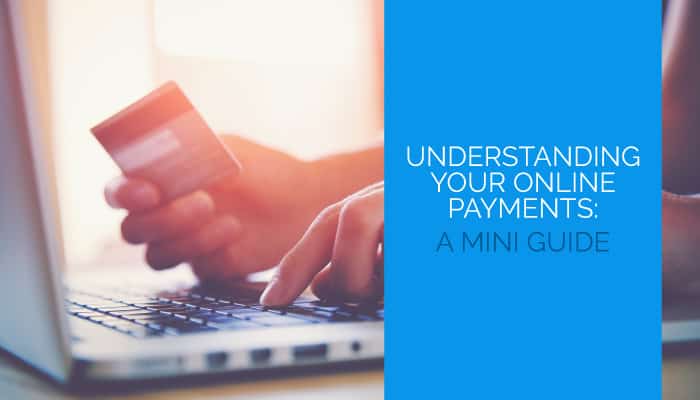If your business or organization has an online store or facilitates paid registrations, your website likely has to process sensitive financial data every day. Because of this, while online payments are convenient, they can also leave risks open to foul play and hacks.
In order to protect your supporter data and provide a seamless payment experience, it’s worth it to take a moment to truly understand what exactly goes on during the online payment process. When you understand what’s going on behind the scenes, you can streamline the process further for your team and your customers. A streamlined online payment process can even help increase conversions for your organization.
To help you optimize your own online payment experience and take advantage of all revenue opportunities, explore the following topics in this mini guide:
- What is the online payment process?
- Why is the right online payment tool so important?
- What kind of online payment tool should you use??
Protecting your user data should be of utmost importance for your organization. Ready to learn more? Let’s dive in.
What is the online payment process?
Let’s start off by discussing what the online payment process even is. To better understand what goes on when a person purchases something on the internet, here are a few common terms and vocabulary you should know:
-
- Payment processor. A payment processor is a company/tool that facilitates financial transactions. The processor relays information from your registrant’s card or bank account information to your own account. Payment processors can be from an acquiring bank or a dedicated online provider. Your online payment processor should have ample security measures in place to protect your users.
- Merchant account. A merchant account is necessary for anyone who wants to facilitate online payments. You can gain a merchant account through your payment processor or from an acquiring bank. Your payment gateway deposits the sales into your merchant account until it is ready to go to your organization’s main bank account.Acquiring bank. The acquiring bank is a financial institution that helps maintain a merchant account. Sometimes the payment processor and the acquirer are the same.
- Payment gateway. A payment gateway connects your merchant account to the payment networks, capturing payment details for each transaction. It helps route the correct payment information to the payment processor or acquiring bank securely.
Using the above terms, we can better make sense of what the online payment process entails. The process begins when a user inputs a payment request through your website or online store, meaning they enter their financial data into your payment form. The payment gateway then helps route that data securely to the payment processor.
The payment processor connects to the user’s bank or credit card company to either approve or decline the transaction. If the transaction is approved, the authorization request is then sent back to the payment processor. The response is then forwarded to the merchant in order to accept the funds.
If you’re interested in learning more about payment processing basics, check out this helpful glossary. There’s a number of terms you might not be familiar with right off the bat, so doing some research on your own is always a good idea.
Why is the right online payment processor so important?
The online payment processor that you choose can have a huge impact on the success and security of any transactions. After all, it’s processing very delicate and important information from your users. If a credit card number gets into the wrong hands, there’s a risk of fraud and other hacks. If you get caught up in these types of breaches, you’ll lose the confidence of your customers.
To better understand why the right online payment processor is so crucial, let’s go over the differences between it and an acquiring bank. The payment processor handles most of the data security when payment information moves from the customer’s bank to your own merchant account. The acquiring bank is more of a facilitator, connecting the customer’s bank and your merchant account. Many times, a payment processor can fulfill both roles.
With a comprehensive payment processor, you don’t need a separate acquiring bank to help you receive funds to your merchant account. Further, the right payment processor can ensure:
- Money is accepted faster. Quickly accept funds into your merchant account so that you can take advantage and use the funds sooner.
- Users can pay in a convenient manner. Without a payment processor, your supporters might have to submit payments over the phone or through the mail.
- Payments are automatically tracked. A payment processor ensures that data is recorded safely and securely. This also means that you can accurately record important user information for your own database. This can help you keep track of your revenue, better establish a budget, and keep track of when balances are due.
- It’s safe and secure. Your online payment processor should have specific steps and actions to prevent fraud and errors such as encryption and tokenization security measures.
- You receive payments anytime. By accepting online payments correctly and safely, you can receive funds 24/7, not just during normal operating hours.
To find the right payment processor for you, you need a tool with capabilities that meet the needs of growing organizations’ like yours. The next section will explore just that!
What kind of online payment tool should you use?
For one thing, your online payment tool needs to be at least PCI-compliant. This is necessary for all tools that process online transactions. The Payment Card Industry (PCI) Data Security Standard (DSS) was created by major card companies to safeguard customer information, so make sure the tools you use comply with those standards.
Along with this security standard, your payment tool should implement additional security features such as:
- Running the processor from a server with a physical firewall
- Ensuring all data is encrypted
- Implementing a Web Application Firewall (WAF) to filter database attacks at the transmission level
- Regularly scanning its database and servers for errors
Besides ample security measures and procedures in place, your payment tool should integrate with your other software. This ensures that the payment experience is streamlined and that key data can be automatically collected to bolster future engagements with users.
For instance, if you collect payments for event tickets, your payment processor should be integrated with your event registration tool. This way, registrants don’t have to go to a third-party page to input sensitive information into your payment form, and you can save their personal details along with their payment information in your primary database.
Additionally, make sure to consider the cost of online payment processors and their fees. Different payment structure for your online payment tool may include:
- A monthly administrative fee plus processing fees on transactions
- A flat per-applicant fee plus additional processing fees on transactions
- Only processing fees (but at a higher rate)
How much you’re willing to invest in your payment tool will depend on your budget and how often you process online payments. However, you should always make sure not to sacrifice security to save a buck.
Businesses and organizations process online payments for all types of reasons. Whether you run an eCommerce store, sell tickets for fabulous events, or offer sign-up opportunities for engaging classes, how you facilitate the transaction depends on you and the tools that you depend on. That’s why investing in comprehensive software with a dedicated payment processor is key. Good luck!
 Asaf Darash, Founder and CEO of Regpack, has extensive experience as an entrepreneur and investor. Asaf has built 3 successful companies to date, all with an exit plan or that have stayed in profitability and are still functional. Asaf specializes in product development for the web, team building and in bringing a company from concept to an actualized unit that is profitable
Asaf Darash, Founder and CEO of Regpack, has extensive experience as an entrepreneur and investor. Asaf has built 3 successful companies to date, all with an exit plan or that have stayed in profitability and are still functional. Asaf specializes in product development for the web, team building and in bringing a company from concept to an actualized unit that is profitable
